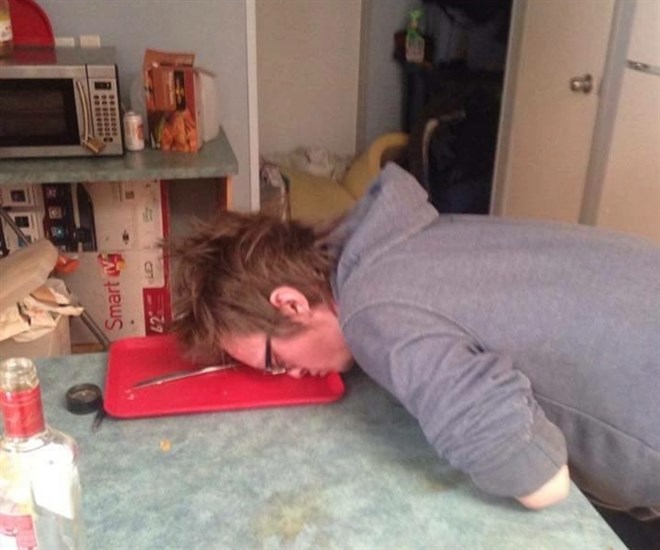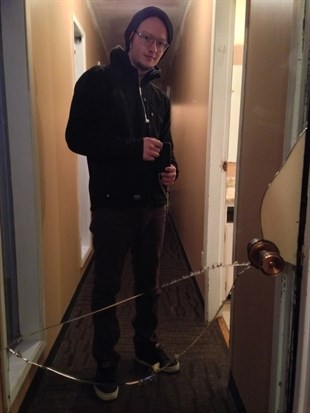
Dayton Wilson, right, and his sister Rayne Wilson get to have meals together like this one after Dayton survived a fentanyl overdose and got clean.
Image Credit: SUBMITTED/Dayton Wilson
October 10, 2017 - 6:30 PM
KAMLOOPS - The last thing Dayton Wilson remembers on Sept. 1, 2016, was shopping at a mall on Hastings Street in Vancouver. The next thing he can recall is waking up in a hospital room after a near fatal fentanyl overdose.
Wilson, 22, grew up in Kamloops and started using drugs at the age of 15. His story isn't unique as he had a happy and loving childhood though it was split between his parents' separate homes. He says he got into smoking pot and drinking alcohol before quickly moving to what became his drug of choice, heroin.
"(My friends) had invited me out to do some... I had always wanted to try it, just not to get hooked to it," he says. "I guess that is what all of the addicts say."
The once successful athlete and loving son says there was just something inside him that drew him to the opioid.
"Heroin intrigued me because I had read a book called Go Ask Alice and I wanted to try everything, which was my goal for a while," he says. "I am pretty sure that I had accomplished that. It sent me into a really bad place in my life."
Wilson says eventually you feel like heroin is the only thing that can make you OK again, calling it a way to escape your life.
"Then you use to escape the fact that you are using," he says. "(It's a) very traumatic cycle for anyone to intentionally or unintentionally put themselves through."
"You use, then you are high, then you feel like crap, and keep using to not feel the pain. The pain of what you had to do to get high."

It wasn't uncommon for Wilson to pass out after consuming drugs. Here he is passed out but still standing after consuming what turned out to be fentanyl.
Image Credit: SUBMITTED/Dayton Wilson
The overdose that happened 13 months ago was the most significant but certainly not the first for Wilson. That came when he was 17 and had just moved to his father's house because of issues with drugs and drinking. His first overdose came on his dad's living room floor.
"One of the most shameful experiences ever," he says. "I hate going back there sometimes because of that moment in my life, because I had let them down so bad."
Living with the shame he felt for overdosing at his dad's house, Wilson chose to leave his family in Kamloops and go live with friends in Grande Prairie. It was a decision that would nearly cost him his life, again.
"Me and my (friend) used to shoot up those green oxy 80s," he says. "Then later we had found out that they were fentanyl. But my drugs of choice (were) heroin and meth, both shot up at the exact same time. Then I had found out that I had a heart infection from shooting up with dirty needles. So it was back to Kamloops and in with my mom."
That ordeal required Wilson to have a catheter placed in one of his veins and running to his heart. It would pump medication or could be used to draw blood. While he had the catheter in he managed to say clean, but as soon as it was removed, he was back to his old ways.
"Shooting dope down by the river and sleeping in a tent," he says of what his life returned to when he was back on the drugs.

Wilson while in treatment before his final overdose.
Image Credit: SUBMITTED/Dayton Wilson
"So then I had made the choice to move down to the Lower Mainland for treatment but that hadn’t worked either because I ended up leaving to go to downtown Vancouver."
The he had another overdose.
This time he collapsed at a coffee shop in Vancouver. He says his family put into a recovery program immediately.
"My stepdad came to pick me up from the hospital and had dropped me off at Hope for Freedom Society for the second time," he says. "That was right when (the Society) had bought their new house in Maple Ridge. So I lived out there, and I was living with them on medical (insurance)."
Wilson says with his money running out and the Society not allowing him to work while receiving treatment, he left the program and went to live with his stepdad which is where he had his final overdose. While his memory of the period surrounding this overdose is hazy, he does know that he would have got the drugs from somebody he didn't know.
"In Kamloops it was my regular dealer and in Grande Prairie it was my regular dealer, but in the Lower Mainland I would go down to East Hastings and Main Street to pick up," he says. "I was trying to buy heroin and methamphetamine but I am pretty sure that I had gotten mostly just fentanyl."
This time Wilson wasn't as lucky as he had been in the past. When he woke up from the overdose on Sept. 1, 2016, he couldn't move his body or speak properly anymore. It has caused aphasia which he says impacts his speech and motor skills. He says it feels like his body isn't able to keep up with his mind anymore.
"I fall into my steps now, like my body leads myself along rather than my legs, so I tend to drag my feet a lot and fall over if I have to walk backwards," he says. His speech is so poor that the interview for this story was conducted using text messages rather than over the phone.
While he has a hard time feeling lucky considering the shape he is in, Wilson says he is appreciative of the life he still has. While living as an addict he knew several people who weren't as fortunate including Tyler Robinson who also grew up in Kamloops and died from an overdose. While Wilson holds the memory of those who died, or are still dealing with addiction, dear to him, he says he can't let himself think about that part of his life too much.
"It sucks, but no, not that much anymore because I don’t like to dwell on the past that much," he says. "I wouldn’t like to say that I just wiped my chin and walked away, but essentially that is what you have to do. Don’t let hate consume you. Mourn the loss of the ones that you love and then move on."
Now that Wilson is clean and sober he has started to think about what the future may hold for him and he plans to go move back to Kamloops and go back to school to get his high school diploma before returning to the workforce.
He feels his story can help society understand addiction and figure out how to get people out of that world before they pop the wrong pill or use the wrong needle. He says we need to reconsider how we look at recovery from addiction.
"I don’t believe in the conventional recovery treatment," he says. "What I believe in is human connection, not that the opposite of using is sobriety. I believe the opposite of using is human connection."
To contact a reporter for this story, email Mike McDonald or call 250-819-3723 or email the editor. You can also submit photos, videos or news tips to the newsroom and be entered to win a monthly prize draw.
We welcome your comments and opinions on our stories but play nice. We won't censor or delete comments unless they contain off-topic statements or links, unnecessary vulgarity, false facts, spam or obviously fake profiles. If you have any concerns about what you see in comments, email the editor in the link above.
News from © iNFOnews, 2017